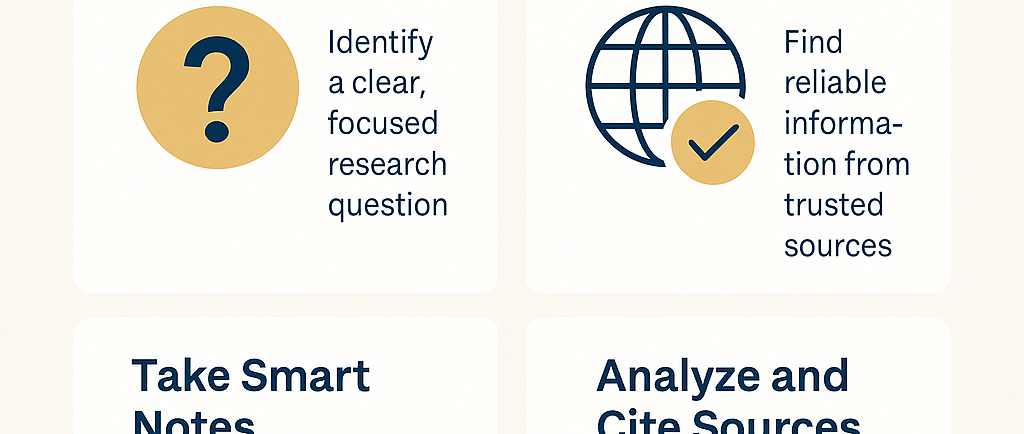How to Develop Research Skills: A 500-Word Guide for Students


In the age of information overload, research skills are more vital than ever. Whether you’re in high school, college, or pursuing independent study, the ability to find, analyze, and apply knowledge is a superpower that sets top students apart. But what does “research” really mean—and how do you actually get good at it?
Let’s break it down into practical, student-friendly steps.
1.Start with the Right Question
Good research begins with a clear, focused question. Avoid vague topics like “climate change” or “Shakespeare.” Instead, aim for specific questions like:
“How has climate change affected agriculture in India since 2000?”
“What psychological themes are explored in Shakespeare’s Macbeth?”
A strong research question gives you a purpose and narrows your search.
2.Use Credible Sources
Not everything on the internet is true (surprise!). Learn to identify and prioritize credible sources such as:
Academic journals (Google Scholar, JSTOR)
Government websites (.gov)
Educational sites (.edu)
Books and peer-reviewed publications
Wikipedia can be a great starting point—but not your final source. Always verify the facts with deeper reading.
3.Master the Art of Searching
Typing keywords into Google is not research. Learn how to use:
Boolean operators (AND, OR, NOT)
Quotation marks for exact phrases (e.g., “digital addiction among teens”)
Filters by date, file type, or source domain
The better your search, the better your information.
4.Take Smart Notes
Organize your findings clearly. Use a system:
Cornell method
Mind maps
Digital tools like Notion, Obsidian, or Google Docs
Note down the source, summary, and your thoughts on it. That’s how ideas become your own.
5.Analyse, Don’t Just Collect
Good research isn’t about gathering 50 links—it’s about making sense of them. Ask:
What patterns or contradictions do I see?
Which arguments are strong or weak? Why?
How does this relate to my research question?
Your voice matters. Analysis is where your originality shines.
6. Cite Your Sources
Plagiarism is a serious issue—even unintentional copying counts. Always give credit using the appropriate citation style (APA, MLA, Chicago). Tools like Zotero, Mendeley, and Google Docs’ built-in citation manager can help.
7. Practice Makes Progress
Like writing or cooking, research improves with practice. Start with small school assignments and level up. Join debate clubs, science fairs, or write your own blog. The more you explore, the sharper your research instincts become.
Final Thought
Research isn’t just about writing papers. It’s about becoming a lifelong learner—someone who questions, explores, and creates. In a world full of noise, being able to find the right answers is a skill that will serve you far beyond the classroom.
So next time you sit down with a topic, don’t just copy-paste. Research with curiosity, and you’ll not only ace your assignments—you’ll train your mind for life.
